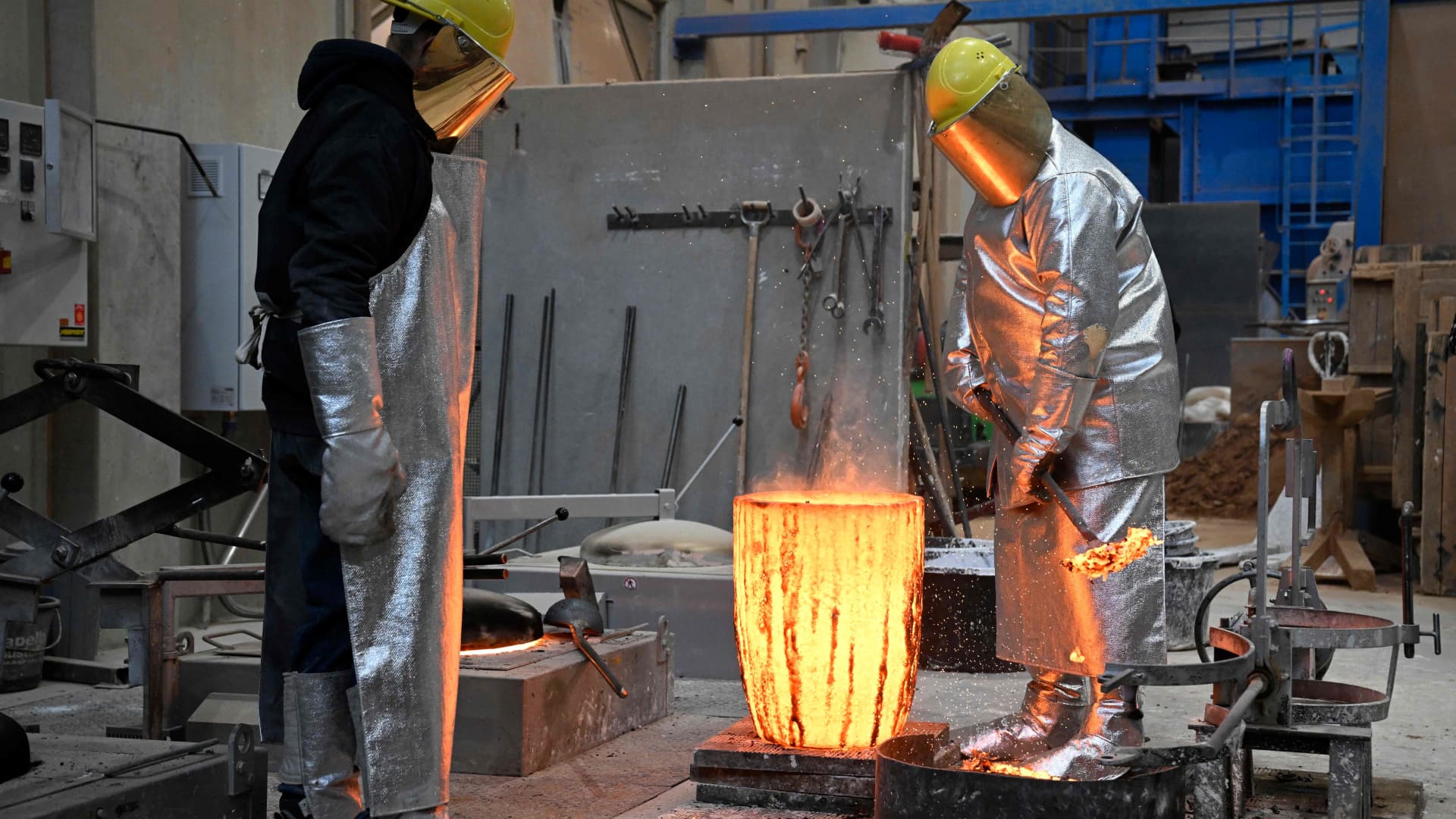German recession ‘very unlikely’ given brighter business sentiment, Ifo head says

Craftsmen work on cast metal for the production of an art work at the Hermann Noack fine art foundry’s production site in Berlin on January 24, 2023. A January Ifo survey showed improved sentiment among German businesses.
Tobias Schwarz | Afp | Getty Images
German business sentiment improved in January, according to a widely watched survey from the Munich-based Ifo Institute — in a prospective sign that Europe’s largest economy could swerve a recession.
Ifo’s Business Climate Index rose to 90.2 points from 88.6 points previously on “considerably less pessimistic expectations,” a release said. This still left the index below its 2021 and early 2022 level.
Companies reported overall lower satisfaction with their current situation. This was offset by a better sentiment on trade and by signals of present satisfaction and future optimism from manufacturing firms.
“The expectation was that there might be a recession in the fourth quarter of ’22 and the first quarter of ’23. Now it looks like the last quarter was flat,” president of the Ifo, Clemens Fuest, told CNBC’s Arabile Gumede.
“The economy may still be shrinking a little in the first quarter, but, given the improvement in expectations for the next month we’re seeing now from businesses, it is very unlikely we will have a technical recession which would be two negative quarters.”
The latest figures from Germany’s national statistics office showed the country’s July-September GDP up by 0.4% on the quarter and by 1.2% on the year. Initial estimates suggest growth of 1.9% for the whole of 2022 and stagnation in the final quarter. But there have been repeated warnings that Germany and other European countries could face a recession amid an energy crisis, a manufacturing slowdown, high inflation and downbeat consumer and business sentiment.
Fuest said developments in the energy market were key to why sentiment has improved, because of both the fall in market prices and because businesses were no longer bracing for potential gas rationing.
“This was the most important risk for the economy, a scenario where gas supplies would simply be insufficient for the winter and parts of manufacturing would have to be cut off, because [the] priority would be give to households, to heating,” Fuest said on CNBC’s “Street Signs” program.
“That scenario is now off the table, gas stores are full, temperatures were relatively mild this winter. That does explain the decline in prices, but it also means we will avoid this very bad risk and hit to the economy.”
It comes after Purchasing Mangers Index figures on Tuesday showed a modest return to January growth from euro zone activity in services and manufacturing. The S&P Global euro zone composite PMI was 50.2, up from 49.3 in December. The 50 mark separates expansion from contraction.
Fuest said a number of factors were improving within German manufacturing, including energy prices and supply chain bottlenecks easing.
“Our expectation would be that the situation will continue to improve slowly but steadily throughout the year,” he said.
Risks remain
One area of concern for Germany was construction, where Fuest noted sharply higher costs and rising interest rates.
The Ifo survey showed construction businesses were very slightly less pessimistic about the future, but also less satisfied with their current situation.
Fuest flagged the “mixed bag” that China’s reopening presents — with the potential for increased demand stoking inflation in energy prices and raw materials, but also for supply chains to flow more smoothly.
Investors will now be mulling how the European Central Bank’s coming interest rate decisions will be impacted by the combination of Europe’s biggest economy potentially swerving a recession, but also a slowdown in headline inflation. The ECB next meets on Feb. 2.
Fuest said his view was that the ECB may be slightly less aggressive than last year, when it raised rates four times to bring its deposit rate to 2%. He expected that hikes needed to continue, given core inflation without food and energy was still rising and union wage demands were taking inflation into account.
“We are not out of the woods on this yet,” he said.









